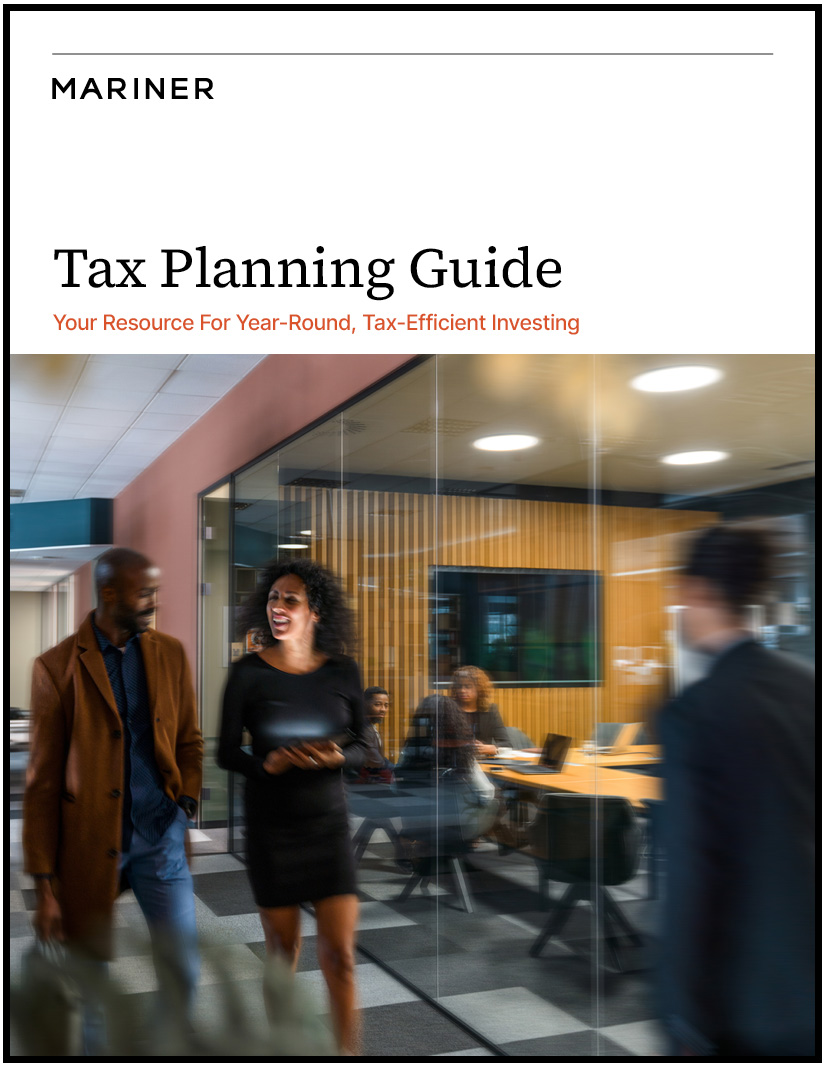Year-end Tax Planning Review

Given that President Biden’s spending bill, including tax proposals, is still being negotiated in Congress, think about meeting with your advisor and tax professional now to review your wealth plan based on current tax laws. Before you meet with your wealth team, read our 2021 tax guide.
Here are a few highlights from the guide to get you started.
- Retirement Plan Catch-up Contributions
- Charitable Giving Strategies
- Estate and Gift Tax Exclusion
- Tax Loss Harvesting
Retirement Plan Catch-up Contributions
In 2021, the maximum contribution to a 401(k) or other workplace retirement plans is $19,500. If you are age 50 or older by the end of the calendar year, you’re eligible to contribute an additional catch-up amount of $6,500 to your retirement plan such as a 401(k) or 403(b).1
You can also contribute a maximum of $6,000 in 2021 to an IRA and an additional $1,000 if you’re age 50 or older.1
Charitable Giving Strategies
Consider “bunching” donations to charities in specific years while limiting donations in other years. In the bunching years, you contribute multiple years of your typical annual donation amount in a single year. This larger lump-sum contribution may allow you to take advantage of itemizing on your tax return.
Another strategy is to create a donor-advised fund. If you make a large donation to the fund, you’ll receive an immediate tax deduction before year-end but can defer until later the decision of which eligible charity will receive the funds.
If you’re age 70 ½ or older, Qualified Charitable Distributions (QCDs) allow you to redirect up to $100,000 of an IRA to charity.2 Any amount contributed is excluded from: adjusted gross income and the calculations that impact overall tax rates; the taxation of Social Security benefits; income tax phase-outs; and Medicare premiums. A QCD can also satisfy your required minimum distribution (RMD) for the year and thereby reduce your taxable income.
Tax Guide: Your Resource for Year-Round Tax-Efficient Investing
Year-round planning with an advisor could help improve your overall wealth plan. Find out more by downloading our tax guide.
Estate and Gift Tax Exclusion
To reduce your taxable estate, consider giving gifts by year-end. In 2021, individuals can give up to $15,000 ($30,000 for married couples filing jointly) tax free as a gift, and that amount doesn’t count against your lifetime gift tax exclusion.
The 2021 lifetime estate and gift tax exemption amount is $11.7 million per person (double that for a married couple). That means an individual can leave $11.7 million to heirs without paying federal estate or gift tax, and a married couple can leave $23.4 million to heirs without owing federal tax.
As of this writing, the modified spending bill under review by Congress doesn’t include lowering the exclusion amount as had been proposed earlier in the process. While that could still change in the final bill, the sunset provision from the 2017 Tax Cuts and Jobs Act is still in place. That means as of Jan. 1, 2026, the federal estate and gift tax exclusions will reduce to $5 million,3 as adjusted for inflation.
Tax-Loss Harvesting
Tax-loss harvesting—offsetting capital gains with capital losses—can help reduce your tax bill. To offset large capital gains realized during the year, consider selling unrealized losses to lock them in. Work with your advisor to sell stock during years in which your income is lower and keep an eye on paying 0% in capital gains whenever possible.
If your capital losses are greater than your capital gains, you may be able to deduct up to $3,000 of losses against ordinary income. The amount of excess losses you can claim is the lesser of $3,000 ($1,500 if filing as married filing separately) or your total net loss.4 Losses that are greater than these limits can be carried forward to future years.
Consult With Your Advisor
Meet with your advisor before year-end to make sure you’re doing what you can to minimize your tax burden. At Mariner, your advisor will work alongside our in-house tax professionals to advise you on proactive planning strategies that fit your financial situation.
Sources:
1 “Retirement Topics-Catch-up Contributions”
2 “What is a Qualified Charitable Distribution?”
4 “How to Cut Your Tax Bill With Tax-Loss Harvesting”
The tax laws discussed are proposed at the time and any final laws or regulations passed may vary significantly from the proposed. Tax laws and regulations are complex and subject to change, and we cannot guarantee that the information herein is accurate, complete, or timely. Any changes to the proposed may also affect any illustrations used in this presentation.
Additional fees may apply for tax planning and preparation services.
This article is limited to the dissemination of general information pertaining to Mariner Wealth Advisors’ investment advisory services and general economic market conditions. The views expressed are for commentary purposes only and do not take into account any individual personal, financial, or tax considerations. As such, the information contained herein is not intended to be personal legal, investment or tax advice or a solicitation to buy or sell any security or engage in a particular investment strategy. Nothing herein should be relied upon as such, and there is no guarantee that any claims made will come to pass. Any opinions and forecasts contained herein are based on information and sources of information deemed to be reliable, but Mariner Wealth Advisors does not warrant the accuracy of the information that this opinion and forecast is based upon. You should note that the materials are provided “as is” without any express or implied warranties. Opinions expressed are subject to change without notice and are not intended as investment advice or to predict future performance. Past performance does not guarantee future results. Consult your financial professional before making any investment decision.
Mariner is the marketing name for the financial services businesses of Mariner Wealth Advisors, LLC and its subsidiaries. Investment advisory services are provided through the brands Mariner Wealth, Mariner Independent, Mariner Institutional, Mariner Ultra, and Mariner Workplace, each of which is a business name of the registered investment advisory entities of Mariner. For additional information about each of the registered investment advisory entities of Mariner, including fees and services, please contact Mariner or refer to each entity’s Form ADV Part 2A, which is available on the Investment Adviser Public Disclosure website. Registration of an investment adviser does not imply a certain level of skill or training.

